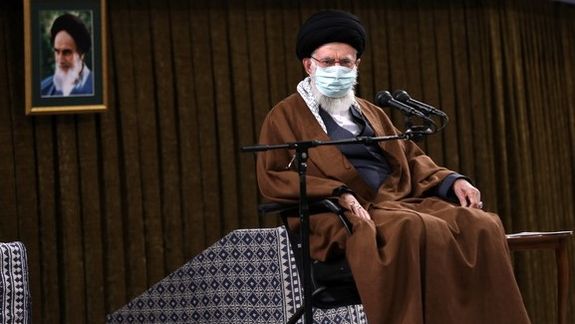Iran's Khamenei Quotes US State Department Saying Sanctions Failed

‘Maximum pressure’ sanctions by the United States have clearly failed, Iran’s Supreme Leader Ali Khamenei declared Sunday, quoting the US State Department.

‘Maximum pressure’ sanctions by the United States have clearly failed, Iran’s Supreme Leader Ali Khamenei declared Sunday, quoting the US State Department.
Calling sanctions an “economic assault” Khamenei said that it caused some hardship for the people “but production did not buckle and the spokesman of America’s foreign ministry a few days ago frankly and explicitly announced that the maximum pressure policy has turned into a humiliating defeat for America.”
Khamenei was quoting State Department spokesman Ned Price who in his press briefing on January 25 said, “The maximum pressure campaign was an abject failure,” adding that former president Donald Trump’s policy did not change Iran’s behavior.
Iran’s economy went into a tailspin in 2018, when Trump withdrew from the 2015 nuclear agreement and imposed tough sanctions. Inflation skyrocketed and government budget deficits soared. The sanctions also impacted Iran’s proxy forces in the region, but they continued their destabilizing operations, although they could have been more effective without the sanctions.
In a speech to managers of Iran’s industrial and economic sectors Khamenei reiterated his ideology of self-reliance and called for “economic jihad” in defiance of sanctions, although he admitted that Iran’s economy performed very poorly in the last decade. At the same time, he claimed victory against US sanctions, that he said were meant to foment dissatisfaction among the people.
But as usual, the Supreme Leader blamed presidential administrations instead of the political and economic systems he presides over and his own policy of perpetually confronting the West and regional countries which have good ties with the United States.
Iran’s centralized economy plagued by corruption and mismanagement, as well as under the pressure of oil export sanctions has had zero growth in the past decade. Even before nuclear sanctions kicked in from 2011, its growth on average was anemic at under 3 percent since the early 1980s.
But Khamenei who has been in power since 1989, increasingly relied on loyal hardliners, and resorted to political persecutions and engineered elections instead of allowing a more accountable political system to take root. At the same time, insiders and the military took over the state-run economy using oil export revenues to perpetuate an unproductive system, as they enriched themselves.
In his speech Khamenei expressed disappointment at low GDP growth, lack of investments, a fast-growing liquidity problem leading to inflation and other serious problems the country faces. He emphasized however, that these difficulties are not just due to sanctions but also an outcome of “wrong decisions or lack of effort.”
He then mentioned a series of problems facing Iran’s domestic production sector, such as low quality of products, highlighting the auto industry which has been blamed for high fatalities in road accidents recently. Nevertheless, he reiterated that self-reliance should be the motto.
Khamenei and other insiders in the Islamic Republic system fail to understand or acknowledge that a modern economy can only grow with less government interference, more interaction with other economies, investments and competition. But the Supreme Leader’s domestic quest to reward supporters and continue a confrontational foreign policy, as well as a nuclear program with military ambitions foreclose paths toward economic success.